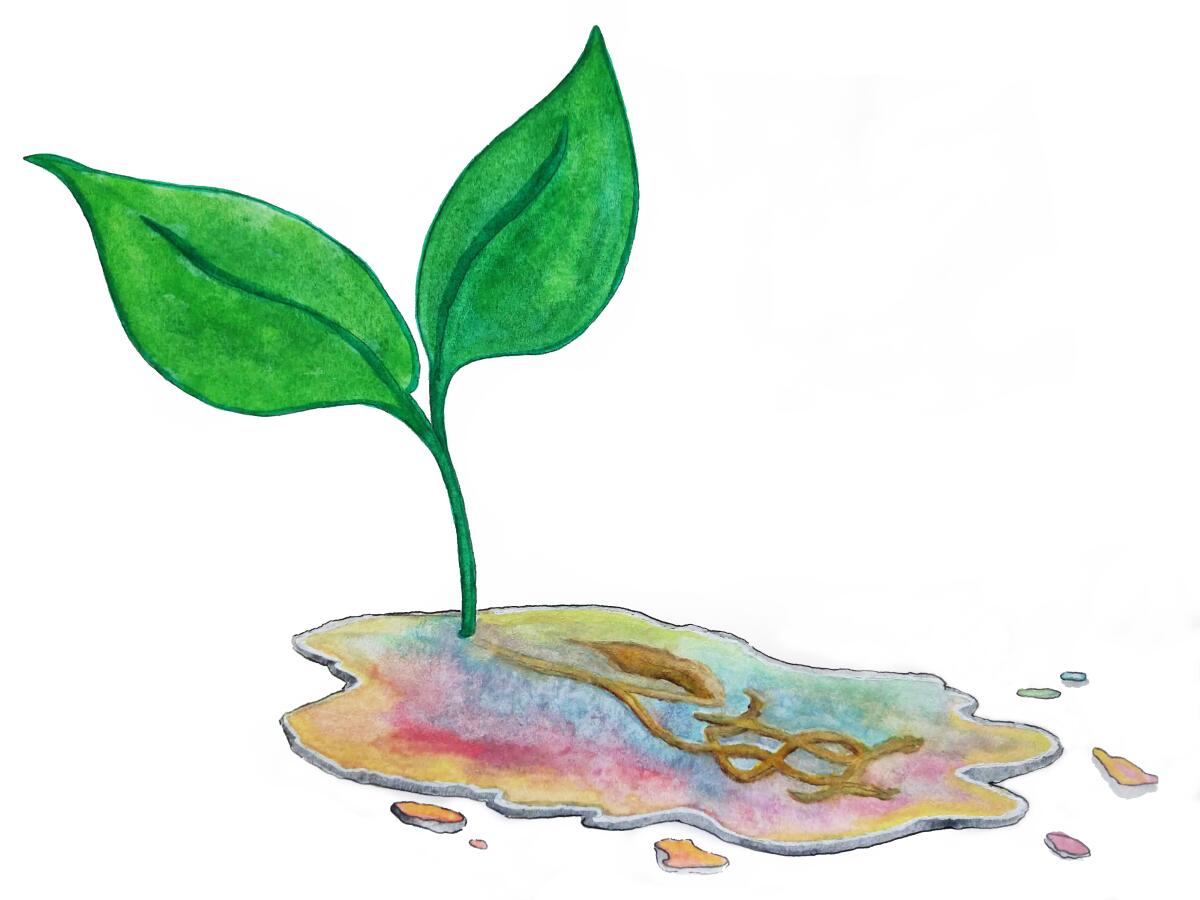Editorial: Happy 50th birthday, Earth Day

- Share via
On an August day in 1969, Sen. Gaylord Nelson, a Democrat from Wisconsin, was in Santa Barbara inspecting what he later described as “that awful oil spill” and “puzzling about what could be done to bring public opinion to bear on the lethargic political community.” Over the next month he hatched a plan. Teach-ins — sit-ins that offered lessons about specific topics — were the rage in the activist 1960s, and Nelson wondered what might happen if the whole country engaged in a teach-in on how human activity imperiled the natural world. Thus Earth Day was born, and 50 years ago today some 20 million people — a tenth of the U.S. population — gathered at thousands of local events, propelling concerns about the environment onto the national agenda, where it’s been ever since.
So how has the environment fared? It’s a mixed record. The nation — and the world — still struggle to balance economic interests with the health of the planet, and to prevent the efforts to employ, equip, comfort and entertain a growing population from degrading the life around us.
There have been some wins for the environment, notably the landmark federal regulations that were enacted in the late 20th century with the kind of bipartisanship we regrettably seem incapable of today. For example, Republican President Nixon, as pro-business a president as they come, created the Environmental Protection Agency (1970) and signed into law the Clean Air Act (1970) and the Clean Water Act (1972).
How much impact the Clean Water Act has had is a subject for debate, though William Ruckelshaus, the EPA’s first director, once pointed out that “even if all of our waters are not swimmable or fishable, at least they are not flammable.” But the Clean Air Act has made a much more measurable difference. According to the EPA, by 1990 the law had “prevented more than 200,000 premature deaths, and almost 700,000 cases of chronic bronchitis were avoided.” The update signed into law by another Republican president, George H.W. Bush, in 1990 helped curb the scourge of acid rain and stop the depletion of the ozone layer.
All told, even as the U.S. GDP has grown, our air and water have become cleaner. And while policies yawed between Democratic and Republican administrations, the long-term trend has been toward stronger and better controls that have not, despite the dire warnings from the pro-business sector, crippled the economy.
Um, did the president of the United States just issue a call to arms against the governments of states run by political critics? With this guy, who knows?
Did Earth Day propel those changes? Not by itself, although it certainly helped Americans feel more engaged with the issue. But that, too, has shifted over time, and not for the better of late. A Gallup poll released Monday found that two-thirds of Americans believe the environmental movement has done more good than harm, though that is down from 76% when Gallup started polling that question in 1992. Compared to 2000, the current poll found that a smaller share of the population was sympathetic to the environmental movement (down from 55% to 44%), had reduced household energy use (83% to 76%) and had avoided products that harm the environment (83% to 69%). That’s a troubling erosion.
As a nation, we still imperil the environment too easily and too frequently. The coronavirus-fueled contraction displays in sharp detail the inarguable connections between economic activity and the environment. Locally, the brown-yellow pall that often hangs over the L.A. Basin has all but disappeared because millions of commutes have not been driven and factories and businesses have reduced work, shifted to telecommuting or stopped production altogether. We can all breathe better, but the cost of that is painful, with more than 1.3 million Los Angeles County residents newly unemployed.
We must have both a vibrant economy and a cleaner world, and that will require us finding more and faster ways to separate our livelihoods from the energy sources that propel global warming, and from activities that poison the environment with such dangerous non-carbon emissions as mercury. Environmental regulations and political pressure have worked to reduce emissions; among other steps, we’ve mandated more fuel-efficient cars and trucks and a faster move to an all-renewable-energy power grid, while promoting electric vehicles and solar energy for homes and other buildings. But we need to do more.
And we need to not move backward. Earth Day arose from that dreadful 1969 oil spill off the coast of Santa Barbara, when 3 million gallons of crude oil blown out from an offshore drilling site created a 35-mile-long oil slick that killed thousands of birds, fish and sea mammals. It’s notable that this Earth Day falls two days after the 10th anniversary of the Deepwater Horizon blowout and leak that sent an astonishing 206 million gallons of oil into the Gulf of Mexico, staining the coastline from Louisiana to the Florida panhandle. That disaster, which killed more than 65,000 birds, 32,000 sea turtles and marine mammals as well as countless fish, sparked fresh regulatory controls by the Obama administration, including real-time monitoring of offshore drilling operations and new safety rules for wells. But the Trump administration, which has made expanding the production and use of fossil fuels a key priority, moved to roll back those regulations, a decision environmental groups are challenging in court.
The federal stimulus checks go to people with Social Security numbers, leaving out millions who work in the U.S. without permission, but who pay taxes.
Our inconsistency in addressing environmental degradation stems in part from inertia, too-powerful industry lobbies and a persistently myopic focus. It’s hard for many people to imagine a world in which human activity does not involve burning oil and gas for energy, emitting chemical pollutants in producing all manner of industrial and consumer goods, or covering the ground with the pesticides and fertilizers that make food production cheaper and more efficient.
But if the coronavirus pandemic teaches us anything, it should be that we are part of the environment, and that while we might be able manipulate portions of it to our own benefit, we ultimately are at its mercy. Earth is for the most part a closed system, and the more poisons we release, the more greenhouse gases we emit, and the more habitats we encroach on, the less sustainable we make the planet for our own kind. The coronavirus infects us mindlessly; we infect our host — Earth itself — deliberately and with too little consideration for the damage we inflict, a function of dangerous hubris.
In the end, we are a species blessed with the ability to think and reason and create. That gives us an edge in adapting ourselves to our environment, but it doesn’t make us invincible. And it’s hard to defend the notion that we are smarter and more developed than other species when we are foolishly paving the path to our own demise. Earth Day reminds us of the delicate intricacies of the natural world, and that we are just one piece of it. And we need to remind ourselves of that every day, not once a year.
More to Read
A cure for the common opinion
Get thought-provoking perspectives with our weekly newsletter.
You may occasionally receive promotional content from the Los Angeles Times.












